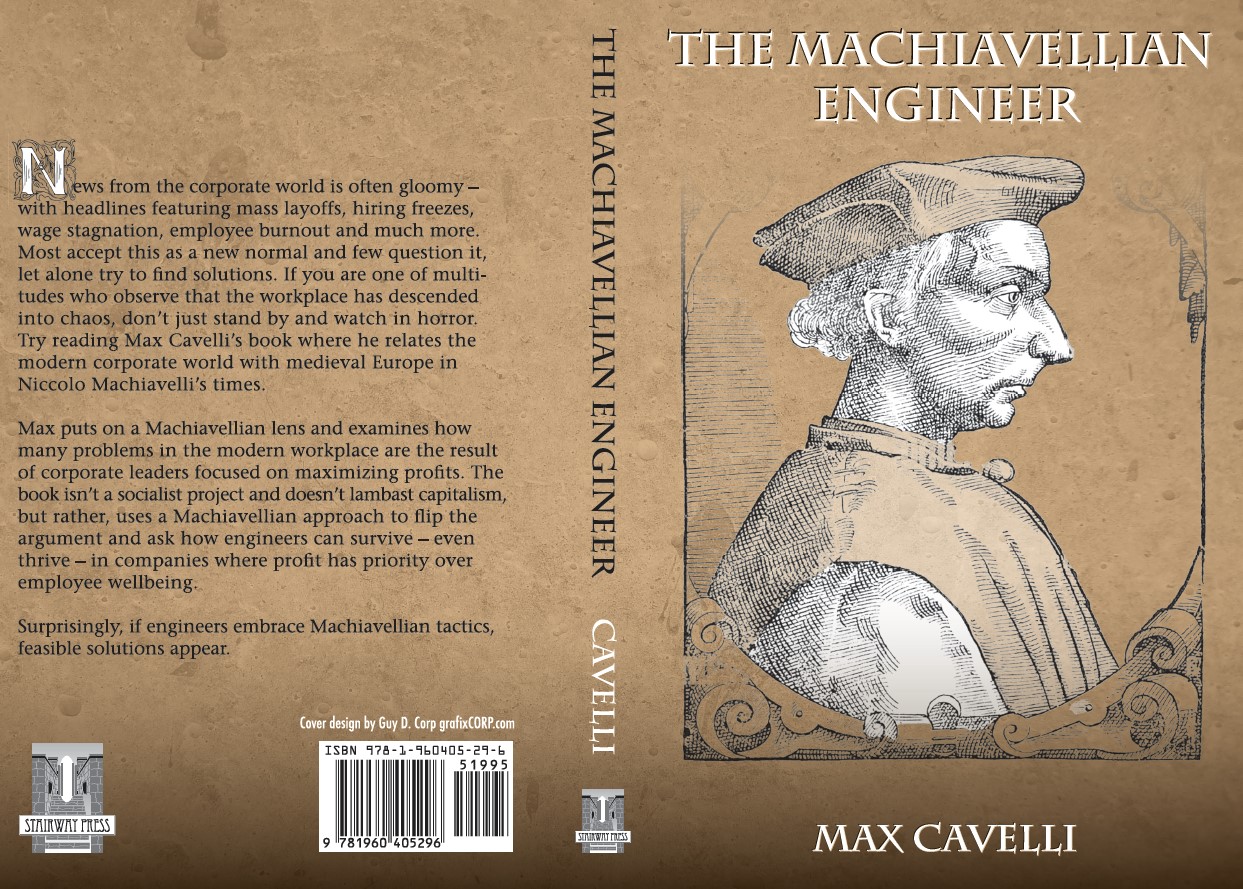The Machiavellian Engineer

News from the corporate world is often gloomy-with headlines featuring mass layoffs, hiring freezes, wage stagnation, employee burnout and much more. Most accept this as a new normal and few question it, let alone try to find solutions. If you are one of multitudes who observe that the workplace has descended into chaos, don't just stand by and watch in horror. Try reading Max Cavelli's book where he relates the modern corporate world with medieval Europe in Niccolo Machiavelli's times.
Max puts on a Machiavellian lens and examines how many problems in the modern workplace are the result of corporate leaders focused on maximizing profits. The book isn't a socialist project and doesn't lambast capitalism, but rather, uses a Machiavellian approach to flip the argument and ask how engineers can survive - even thrive - in companies where profit has priority over employee wellbeing.
Surprisingly, if engineers embrace Machiavellian tactics, feasible solutions appear.
Click here for the link to the book - The Machiavellian Engineer
Machiavelli’s writings have polarized the world for many decades, with many denouncing him as the teacher of evil, and others adopting his suggestions as the words of the messiah. His philosophy is quite often used in politics and by industry leaders. This book takes a deep dive into his most famous work “The Prince”, and examines how his writings from the 1500s are still relevant in the modern corporate world.
Hence it is necessary for a prince wishing to hold his own to know how to do wrong, and to make use of it or not according to necessity.
The book is presented as a survival guide to engineers in corporations, on how they should interpret management policies, side-step potential traps and obstacles placed by the management, and how they can thrive even while working in a mundane job with mediocre managers.
Therefore, it is necessary to be a fox to discover the snares and a lion to terrify the wolves.
The book examines every chapter of “The Prince” with a fine comb, presenting numerous quotes, some very famous and others not so well-publicized, and compares Machiavelli’s analysis of medieval European politics with the modern corporate world.
Hence, it is that all armed prophets have conquered, and the unarmed ones have been destroyed.
The book begins with an examination of the structure of corporations, and how these structures lead to intrinsic challenges that every engineer must face. The book describes how the managements of corporations use a number of techniques such as nepotism, harassment and bullying to suppress engineers, and how quite often, the solutions that are generally proposed to deal with these are ineffective. The book proposes a number of solutions to engineers that can be used effectively under most circumstances, while describing in detail the risks that an engineer might face in different types of corporations.
A prince ought to have no other aim or thought, nor select anything else for his study, then war and its rules and discipline.
The book describes how engineers can find ways to enhance their skills, which in turn will increase their employability. The book also describes certain behavioral traits that engineers can greatly benefit from, and how it is quite often necessary for an engineer to be deceitful in order to survive in a corporation.
Therefore a prince, so long as he keeps his subjects united and loyal, ought not to mind the reproach of cruely.
The book differs from most other books that aim to convince engineers to engage with the management and sing the company song. The book suggests that in a vast majority of cases, such greater engagement though may be favorable to the management, is of very little benefit to engineers.
With us there is great justice, because that war is just which is necessary, and arms are hallowed when there is no other hope but in them.
The book emphasizes the need for engineers to remain technically proficient, and seek independent activities to fulfil their interests and objectives. The book describes a number of benefits, some quite obvious, but many others that are subtle and are understandable only when one examines in great depth the advantages of independent projects and networking. In conclusion, this book proposes a number of solutions by which engineers can find a great deal of satisfaction and contentment, despite working in a job that might seem to have no future, and where their tasks are largely trivial.